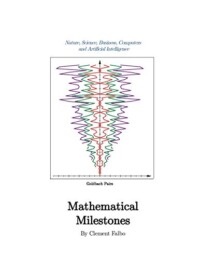Title: Mathematical Milestones: Nature, Science, Business, Computers, and Artificial Intelligence
Author: Clement Falbo
Publisher: Clement Falbo
ASIN: B08NRL49TW
Pages: 440
Genre: Mathematics and Science
Reviewed by: Aaron Washington
Pacific Book Review
Mathematics is an interesting and fascinating subject which has helped mankind since time immemorial. It is one of the subjects that have made life easier, more remarkable, and balanced. In his book, author Clement Falbo gives the intriguing history of mathematics, how esteemed scholars and scientists who have over time broadened and made advancements with the subject.
In Mathematical Milestones: Nature, Science, Business, Computers, and Artificial Intelligence, the reader is taken through the growth of mathematics in the last 400 years as well as previous years. Reading about mathematics is intriguing and fascinating. The comparisons the author makes between ancient times and today’s systems, the constant methods that have remained over time, and the contribution of scholars were some of my favorite parts of his narration.
The author starts the book by discussing where mathematics originated. Not many people know of the origin of mathematics and the author does an impeccable job explaining it. The notes on algebra, analytical geometry, modern mathematics and practical solutions were useful material for information and understanding just how easy, yet intricate, math can be. What makes Mathematical Milestones: Nature, Science, Business, Computers, and Artificial Intelligence an enjoyable read is how the author breaks down the various elements of math. The reader is made to understand minute and critical features which are not explained very often in mathematical text books. My most favorite sub-topic in the book was on numbers. Everyone uses numbers in their daily life, and I found this topic to be intriguing because of the detailed information on real numbers. The author discussed topics like distance and time, axioms, field theorems, summation sign, graphs, and some applications of logarithms among other related number topics. The chapter on Logic was another favorite as the author wrote on subjects like paradoxes, non-Aristotelian, multivalued logic, and philosophical controversy.
Clement Falbo’s content in the book is solid. The author is also casual with the explanations, which was a great strategy for readers that fancy laid-back reading. Even when writing about technical terms, the author simplifies every term for easier comprehension of the reader. Both the uncomplicated and difficult topics were fun to read about because of how compelling the author was in the discussions. There were light moments amidst serious subjects, and the author also told social and relatable stories to break the monotony of numbers.
The author knows which terms to use, the diction to apply, the areas to focus on, and the best phrases. Even when talking about formulas, numbers and ancient history, the reader is able to follow the narration without getting lost. Mathematical Milestones: Nature, Science, Business, Computers, and Artificial Intelligence is a great addition to every numbers and history lover, and aspiring math’s scholar’s to-be-read-list. I enjoyed the anecdotes, bits of his personal and professional life, and the overall tone of the author.


